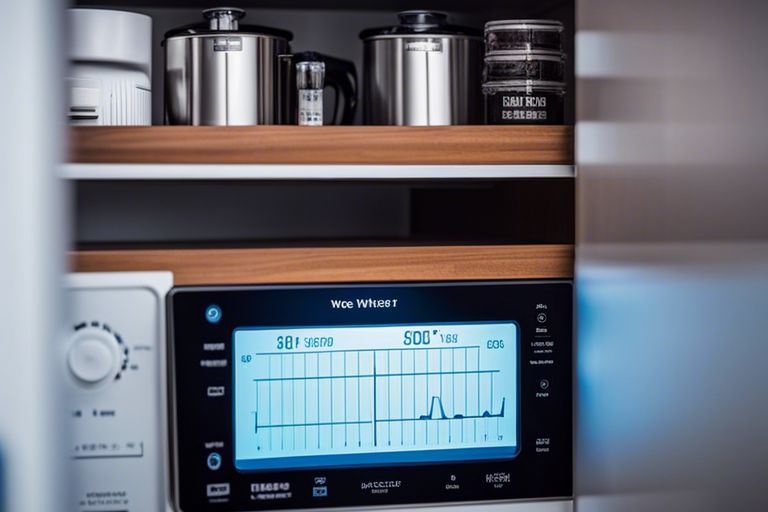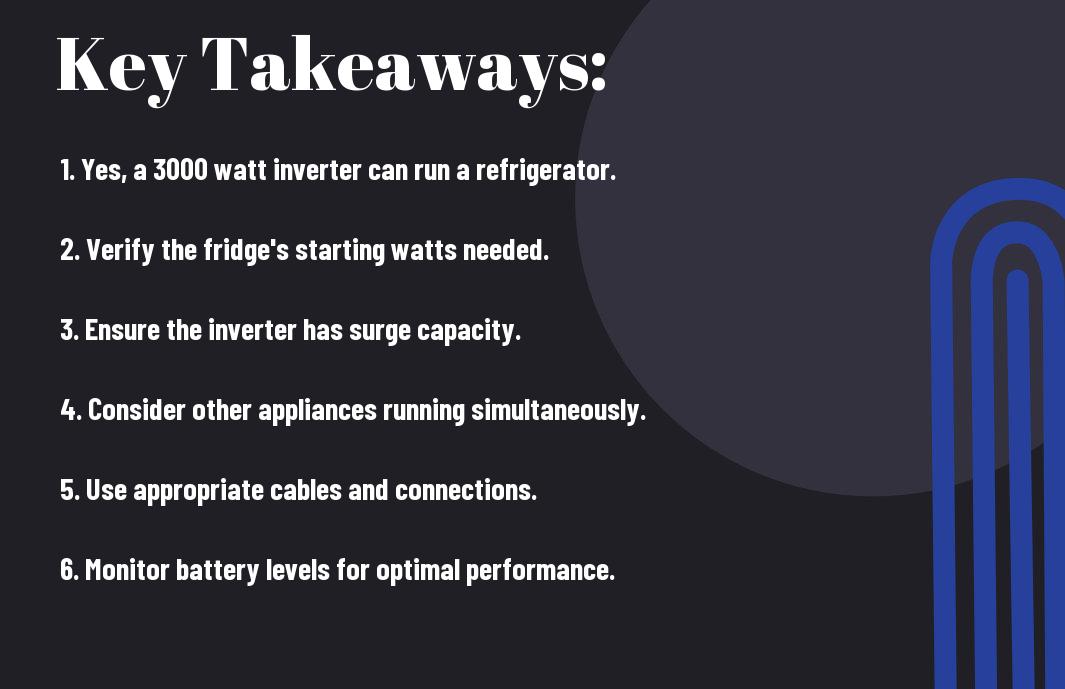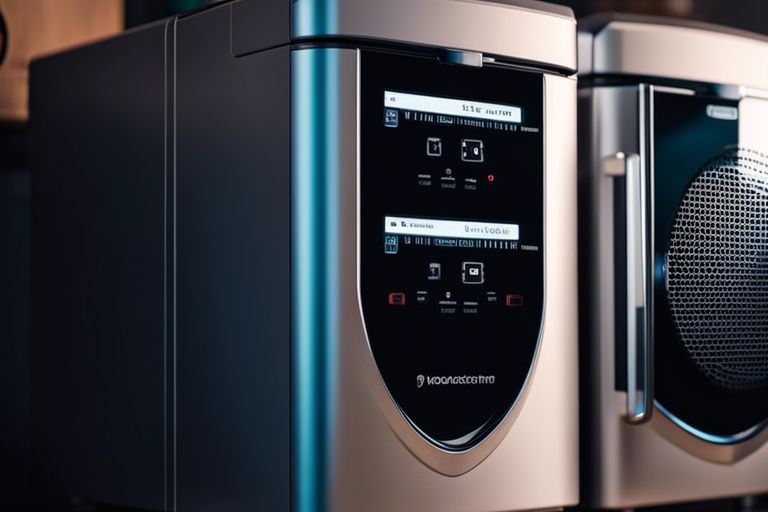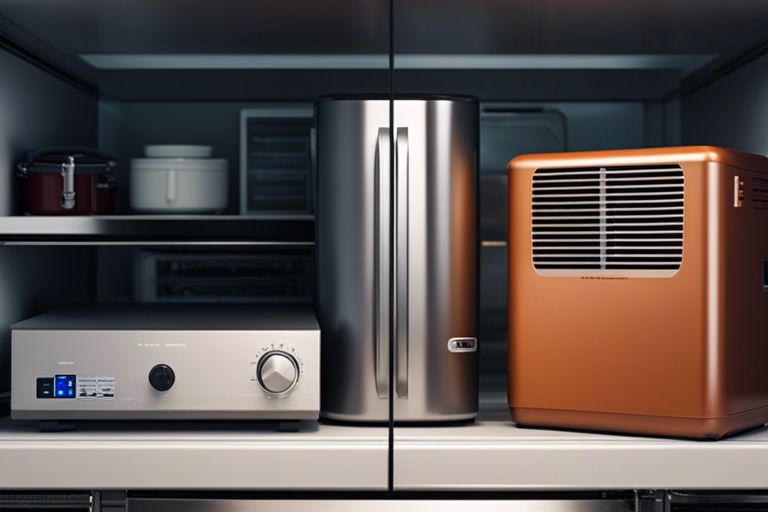Just imagine having the power to run your refrigerator during a blackout with a 3000 watt inverter. When considering power requirements, the key lies in understanding the wattage needs of your refrigerator model. By delving into the intricacies of power consumption and inverter capacity, you can ensure your fridge stays cool even when the lights go out. Let’s explore the science behind running a refrigerator on a 3000 watt inverter.

Key Takeaways:
- Check the refrigerator’s starting and running wattage: Ensure the 3000 watt inverter can handle the refrigerator’s initial surge of power when it starts up as well as its continuous running power.
- Consider other appliances: If the inverter is also powering other appliances simultaneously, it may affect the ability to run the refrigerator efficiently.
- Invest in a Pure Sine Wave inverter: A Pure Sine Wave inverter is ideal for powering sensitive electronic devices like refrigerators as it provides clean and stable power.
- Monitor the inverter’s performance: Keep an eye on the inverter’s temperature and performance when running the refrigerator to ensure it is working optimally.
- Consult the refrigerator manual and manufacturer: If unsure, refer to the refrigerator’s manual or contact the manufacturer to determine if a 3000 watt inverter is suitable for running the refrigerator.
Inverter Basics
What is an inverter?
Basics: An inverter is a device that converts direct current (DC) into alternating current (AC). DC is the type of electrical current produced by batteries, while most home appliances and electronics run on AC power from the grid. Inverters are imperative for situations where AC power is not available, such as in RVs, boats, or during power outages.
How does an inverter work?
Inverter: In simple terms, an inverter works by using electronic components to rapidly switch the direction of the current, mimicking the alternating pattern of AC power. This process involves converting the DC power from a battery into a high-frequency AC signal, which can then power your devices.
Does: It’s important to note that the power output and capacity of an inverter are crucial factors to consider when running appliances like refrigerators. A 3000 watt inverter, for example, may be able to run a refrigerator, but you must check the refrigerator’s specific wattage requirements to ensure the inverter can handle the load effectively.

Refrigerator Power Requirements
Average power consumption of a refrigerator
While you may not think about it often, your refrigerator is one of the most critical appliances in your home. It runs 24/7 to keep your food fresh and drinks cold. The average power consumption of a refrigerator typically ranges from 100 to 800 watts, depending on the size, age, and efficiency of the appliance.
Factors affecting refrigerator power consumption
Power usage of a refrigerator can be influenced by various factors. Some of the key factors include the age of the refrigerator, its size, temperature settings, frequency of door openings, ambient temperature, and the efficiency of the appliance. Perceiving these factors can help you understand why your refrigerator may be consuming more power than expected.
- Your refrigerator’s age: Older refrigerators tend to be less energy-efficient and can consume more power.
- Size of the refrigerator: Larger refrigerators generally require more power to operate efficiently.
- Temperature settings: Lowering the temperature settings can increase power consumption.
- Frequency of door openings: Opening the refrigerator door frequently can cause it to consume more power.
A thorough understanding of these factors can help you make informed decisions about the power consumption of your refrigerator and identify ways to optimize its energy usage. A well-maintained, properly sized, and energy-efficient refrigerator can help you reduce your electricity bills and minimize your environmental impact.

Can a 3000 Watt Inverter Run a Refrigerator?
Once again, you might be wondering if a 3000 watt inverter can effectively run your refrigerator. To find out, you’ll need to consider the power requirements of both your refrigerator and the inverter. If you’re unsure about how many batteries you might need for a 3000 watt inverter and what appliances it can power, check out this article on How Many Batteries for 3000w Inverter and What Will it Run.
Calculating the required power for your refrigerator
Calculating the power needed to run your refrigerator with a 3000 watt inverter involves determining the starting wattage and running wattage of the appliance. The starting wattage is typically higher as the compressor kicks in, so make sure to check your refrigerator’s specifications for this information. Once you have both values, add a buffer of about 20% to ensure smooth operation, as refrigerators can draw extra power intermittently.
Matching the inverter capacity to your refrigerator’s needs
When matching the inverter capacity to your refrigerator’s needs, ensure that the inverter can handle the starting wattage of the refrigerator. While a 3000 watt inverter may seem like it can manage most household appliances, it’s crucial to account for the initial power surge when the fridge turns on. Additionally, consider the refrigerator’s running wattage to ensure the inverter can sustain its operation without overloading.
Bear in mind, it’s not just about the wattage output of the inverter but also its surge capacity to accommodate appliances with higher starting wattages like refrigerators. Be sure to choose an inverter that can handle these power surges to prevent any disruptions in your refrigerator’s functionality.
Inverter Efficiency and Power Loss
All inverters have an efficiency rating that indicates how much power is lost during the conversion process. Efficiency is crucial because the higher the efficiency rating, the less power is wasted as heat. If you are using a 3000 watt inverter like the one mentioned in the Growatt 3000 inverter newbie question, it’s imperative to consider the efficiency to ensure optimal performance.
Inverter efficiency ratings explained
On the technical side, inverter efficiency is expressed as a percentage and typically ranges from 80% to 95%. This rating tells you how much DC power from your battery is successfully converted into AC power for your appliances. The higher the rating, the more efficiently the inverter operates, minimizing power loss and maximizing the use of your battery’s capacity.
How power loss affects your refrigerator’s performance
On the flip side, if your inverter has a lower efficiency rating, there will be more power loss during the conversion process. This means that even though you have a 3000 watt inverter, you may not get the full 3000 watts to power your refrigerator effectively. The power loss can result in slower performance, increased strain on the inverter, and potentially higher electricity bills if you are relying on a renewable energy source like solar power.
Understanding the relationship between inverter efficiency and power loss is key to ensuring that your refrigerator, or any other appliance, functions optimally. By choosing a high-efficiency inverter, you can maximize the performance of your refrigerator while conserving energy and reducing wasted power.
Sizing the Inverter Correctly
Oversizing vs. undersizing your inverter
Many people wonder whether it is better to oversize or undersize their inverter for running appliances like refrigerators. Correctly sizing your inverter is crucial to ensuring it can handle the power requirements of your refrigerator and other devices. If you oversize your inverter, you may end up spending more money than necessary, as larger inverters tend to be more expensive. On the other hand, if you undersize your inverter, it may not be able to handle the starting surge of your refrigerator, leading to frequent shutdowns and potential damage.
Consequences of incorrect inverter sizing
Correctly sizing your inverter is imperative to avoid potential consequences of oversizing or undersizing. If you oversize your inverter, you may experience reduced efficiency and higher costs upfront. Conversely, if you undersize your inverter, it may struggle to power your refrigerator effectively, leading to inefficiency and potential damage to both the inverter and the appliance.
It’s crucial to carefully consider the power requirements of your refrigerator and any other devices you plan to run off the inverter to ensure you select the right size. Incorrectly sizing your inverter can lead to performance issues and increased costs in the long run.
Additional Considerations
Not only do you need to consider the wattage of the inverter when running a refrigerator, but you also need to think about other important factors to ensure the system runs smoothly. Here are some additional considerations to keep in mind:
Battery capacity and depth of discharge
Capacity plays a crucial role in how long your refrigerator can run on the inverter. A higher capacity battery will allow your refrigerator to run for a longer period. Additionally, the depth of discharge (DoD) of the battery – how much you can safely drain it – also impacts performance. It’s important not to drain your battery completely as this can reduce its lifespan.
Charging system requirements
Charging your battery efficiently is vital for the overall performance of your system. A proper charging system will ensure that your battery is topped up and ready to power your refrigerator when needed. Make sure your inverter is compatible with your charging system to avoid any issues.
This includes using the right size cables to connect your battery to the inverter and charging system. Using cables that are too small can lead to voltage drop and inefficient charging, affecting the overall performance of your system.
Wiring and electrical safety considerations
When setting up your inverter system, pay attention to the wiring and electrical safety measures. Properly sized wiring is crucial to handle the load of the refrigerator and prevent overheating or electrical fires. Make sure all connections are secure and follow safety guidelines to avoid any accidents.
Wiring your system correctly and implementing safety measures will not only protect your equipment but also ensure the safety of your household. It’s important to follow electrical codes and guidelines when setting up your inverter system.
Conclusion
Drawing together the information presented in this article, it is clear that a 3000 watt inverter has the capacity to run a refrigerator. By understanding the power requirements of your specific refrigerator model and selecting an inverter that can handle the surge power and continuous power needed, you can ensure that your refrigerator will operate efficiently during power outages or when off-grid.
Remember to always consult the manufacturer’s specifications for your refrigerator and the inverter to guarantee compatibility and avoid any potential damage to your appliances. With the right setup, you can enjoy the convenience of keeping your food cold even in challenging situations where power supply may be limited.
FAQ
Q: Will a 3000 watt inverter run a refrigerator?
A: Yes, a 3000 watt inverter should be able to run a refrigerator. Most refrigerators require around 800-1200 watts to start up and 100-200 watts to run continuously, so a 3000 watt inverter should provide enough power for normal operation.
Q: Can a 3000 watt inverter run other appliances along with a refrigerator?
A: Yes, a 3000 watt inverter should have enough capacity to run a refrigerator along with other small appliances like laptops, lights, fans, and small kitchen appliances simultaneously, as long as the total power draw does not exceed 3000 watts.
Q: What type of battery is recommended to use with a 3000 watt inverter for running a refrigerator?
A: It is recommended to use deep cycle batteries with a 3000 watt inverter for running a refrigerator. Deep cycle batteries are designed to provide a steady amount of power over a longer period of time, making them ideal for use with inverters and appliances that require continuous power.
